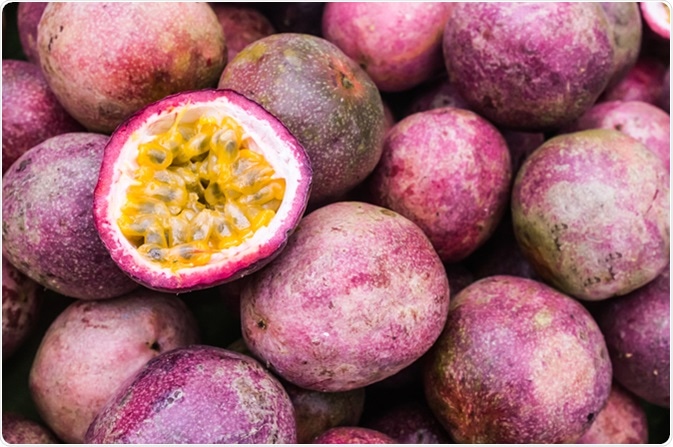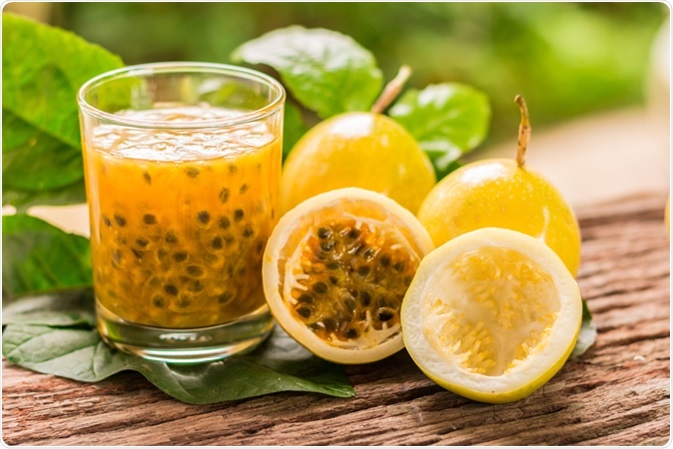Modern lifestyle diseases, such as obesity and metabolic syndrome (MS), may lead to many complications, including hypertension, diabetes, hyperlipidemia and cardiovascular disease. They also accelerate the aging processes. Appropriate dietary interventions may help to regulate glucose and energy metabolism, and thus improve the outcome for affected individuals.
Among the interventions are caloric restriction, which helps reduce insulin resistance by preventing sustained hyperglycemia. This often requires long-term control of dietary choice and portion size, which is difficult to maintain for a majority of overweight subjects. For this reason, functional foods, such as passion fruit are being studied for their potential contribution to reducing weight and insulin resistance.

Passion Fruit. Image Credit: NECHAPHAT / Shutterstock
Metabolic Benefits
One compound in passion fruit, which has garnered plenty of interest is piceatannol, an analog of resveratrol. The latter is a polyphenol, which has been shown to lower glucose levels, and to increase stamina, in several rodent studies.
A clinical study on resveratrol in humans with excessively high body mass index (BMI) confirmed these results, as well as its ability to produce a reduction in blood pressure and higher mitochondrial respiration in muscle tissue, as well as the activation of several muscle kinases. Piceatannol shares many of these benefits, improving metabolic parameters and glucose breakdown, reducing vascular tone, increasing eNOS levels (which is vaso-protective), promoting collagen synthesis, and reducing ultraviolet damage to the skin. In fact, its activity is higher than that of resveratrol.
One study showed that insulin levels in serum were significantly reduced in the fasting state in overweight men with piceatannol supplementation, as well as a fall in the blood pressure and the heart rate. This was not seen in women or in men with a normal BMI. Another study in mice showed inhibition of postprandial rises in blood glucose levels as well, which points to the potential for anti-diabetic activity with piceatannol supplements. Further studies are needed to understand the variation in effect with body composition and gender, as well as to perform more sensitive and long-term evaluations of the changes in glucose and insulin parameters.

Passion fruit.Image Credit: Charoenkrung.Studio99 / Shutterstock
Cardiovascular Benefits
The cardiovascular effects of piceatannol seem to be mediated by the antioxidant and anti-inflammatory effects of the polyphenol. It is known that failure of vasorelaxation, which is mediated by eNOS activity, is a characteristic of endothelial dysfunction. This would lead eventually to atherosclerosis via lipid oxidation and inflammation of blood vessels. It also activates dimethylarginine dimethylaminohydrolase, and thus inhibits the natural deactivation of eNOS. Again, it increases eNOS stability, thus prolonging its half-life. It has other mechanisms of vascular anti-inflammatory action as well. Piceatannol thus has profound cardioprotective effects, and a central mechanism of action cannot be ruled out as well. In addition, it may help to stabilize cardiac myocytes.
Each 100g serving of passion fruit supplies about 30g potassium, or a quarter of the daily requirement. This is one of the best things to do to reduce cardiovascular risk. Potassium is a vasodilator, and it is necessary for the operation of the vital ion channels in the cell membranes.
Antioxidant Benefits
Passion fruit also contains many other antioxidants, such as C-glycosyl flavonoids, chlorogenic acid, isovitexin, caffeic acid, quercetin, rutin, and luteolin. These also play a role in glycemic and lipid control, but the exact effects and doses have to be elucidated through further study. A single serving can contain about 30g of vitamin C, and significant amounts of carotene and cryptoxanthin, all of which are powerful antioxidant molecules lowering the risk of age-related degeneration, cancers, and cardiovascular disease. Vitamin C also stimulates collagen synthesis and improves epithelial health, as well as being an immunomodulator to boost innate immunity.
Dietary Fiber
Passion fruits also contain large amounts of dietary fiber (98% of the daily recommended intake), which helps improve intestinal health, reduces the pH and ammonia levels in the colon and thus encourages healthy intestinal microbiota, and relieves constipation and flatulence. Again, fiber reduces appetite and this again leads to lower insulin levels and reversal of the metabolic syndrome. It also results in lower levels of cholesterol in the blood. The rind of the fruit is also rich in soluble fiber, which has independent anti-diabetic and anti-dyslipidemic effects. Fiber also lowers the risk of colorectal cancer. Piceatannol also counteracts colonic irritation leading to intestinal inflammation.
Eye Health
The large amounts of vitamin A in passion fruit can safeguard eye health against age-related macular degeneration, prevent cataracts, and lower the rate of skin aging and wrinkling.
Anemia
Passion fruit also contains appreciable amounts of copper, iron, magnesium and phosphorus, contributing to bone health and to normal RBC counts, which helps to counter anemia.
Anxiolytic Benefits
Some rodent studies found a marked anxiolytic and sedative effect upon supplementing the diet with passion fruit, due to the alkaloid harman. This can also help to relieve insomnia.
Anti-Tumor Benefits
Anticancer effects include apoptotic actions upon human cancer cell lines, as well as inhibition of migration and epithelial anchoring of metastatic cells in breast and prostate cancer. Piceatannol also inhibits HDL uptake by neurons to which ecto-F1-ATPase autoantibodies are bound. It may thus may slow the development and progression of Alzheimer’s disease. It may also inhibit antigen-induced WBC degranulation and thus prevent allergic reactions.
Conclusion
Passion fruit is not just a delicious tropical addition to the menu, but a powerhouse of several potential health benefits and should become a part of a varied and rich diet whenever available in season.
Further Reading
Last Updated: Feb 26, 2019